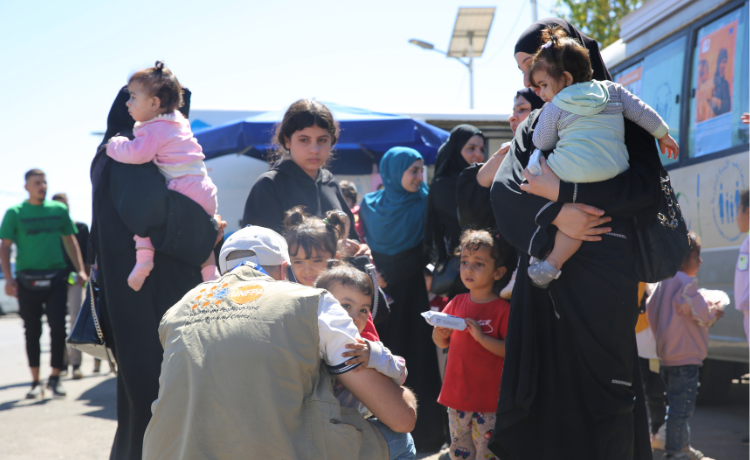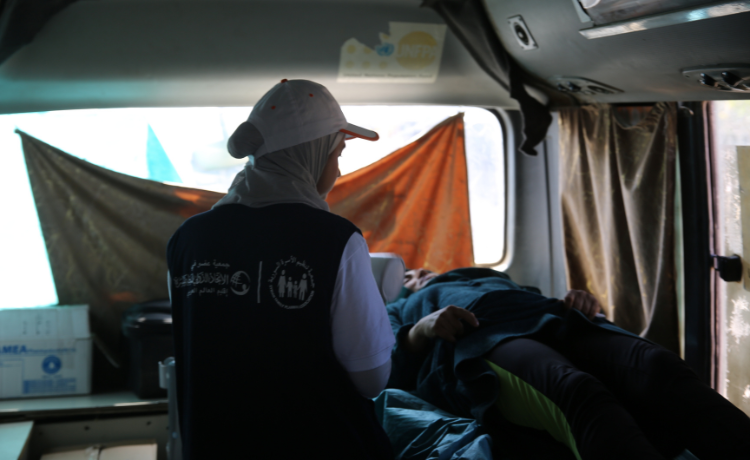News
Women, girls see health access deteriorate as hostilities intensify displacements across Gaza, Lebanon and Syria
- 10 October 2024
News
DAMASCUS, Syria / BEIRUT, Lebanon / JERUSALEM, Palestine – Recent escalations in the conflict in the Middle East are driving mass displacements and interrupting critical health services for women and girls. Israeli authorities are forcing new hospital evacuations in northern Gaza, including two that provide emergency obstetric care for pregnant women, amid bombardments and ground operations. The evacuation orders are driving Gazans to the south, a region facing overcrowding and a deficit in basic services, United Nations officials described on Monday.
Meanwhile, health services in Lebanon have been severely disrupted. A least 98 primary health centres have been forced to close in the last year, and five hospitals are now not functioning either due to physical or infrastructural damage. Thousands continue to cross the border from Lebanon into Syria, many of them displaced for the second or third time.
The mass displacements are taking a particular toll on women and girls, with no reprieve in sight as hostilities continue to intensify.
An estimated 60,000 women have given birth in Gaza since the start of the conflict one year ago. In that time, UNFPA, the United Nations sexual and reproductive health agency, has helped some 45,000 of those women deliver safely – yet many others have been unable to reach safe childbirth services. And now many health centres, already barely functional, are shuttering because staff are trapped at home by fighting, unable to report to work, or because sexual and reproductive health personnel are being redeployed to the south to address the influx of displaced people.
“The scale of devastation in Gaza remains unparalleled,” said Nestor Owomuhangi, UNFPA’s representative in Palestine. “The destruction, the loss of life, the despair is overwhelming.”
Medical personnel are reporting sharp increases in miscarriages and maternal deaths, Mr. Owomuhangi said, adding that anxiety and malnutrition are hindering breastfeeding for new mothers, with thousands of pregnant women on “the verge of famine” and “in famine-like conditions”.
New mother crosses the border clutching C-section wound

UNFPA and its partners are also scrambling to meet the needs of people fleeing bombardment in Lebanon.
Samah, a 28-year-old Lebanese mother of three, became a refugee just three days after undergoing a C-section delivery.
“We were close when the strike happened, and the night became day – bright as if the sun had risen,” she told UNFPA.
She fled to the Syrian border, but a crater left in the road by Israeli strikes proved impassable by car, so she and her children traveled part of the way on foot. "I wrapped my stomach with a clean cloth, carried my son and went down to the border," she said.
Fearful of infection, Samah sought care at a clinic once she and her children reached the border. The UNFPA-supported medical team there examined her C-section wound and assured Samah both she and her newborn were in good health.
"The moment I saw the paediatrician check my baby and the nurses care for my wound, I felt hope again," Samah said. "They gave me antibiotics, nutrients, and more than that, they gave me a sense of safety."
Rising needs among survivors

The health needs of the displaced include not only medical care, but also psychological support and treatment for trauma.
Yet many providers of those services are themselves grappling with displacement.
“The women at the shelter relate to us, and we relate to them,” said Lama, a programme coordinator specializing in sexual and reproductive health and the prevention of gender-based violence. She works with Amel, a UNFPA partner in Lebanon.
This week, she found herself fleeing bombardments in southern Beirut. "I didn’t even think of bringing a few winter clothes with me. We had around 15 minutes to grab what we could and leave our homes.”
Still, she continues her work coordinating services for others. The collective shelters are overflowing, and have too few bathrooms. An increasing number of survivors are seeking support for gender-based violence, Amel staff told UNFPA.
“It is our responsibility, now more than ever, to ensure they receive much-needed support,” Lama said.